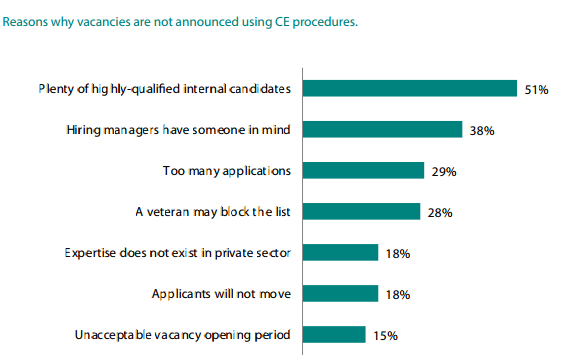
Jirsak / Shutterstock.com
Seven in 10 Federal Managers Sometimes Predetermine Who Will Fill Job Vacancies
Federal hiring laws are no longer protecting a fair and open process, report finds.
The federal hiring process has become too complex to ensure the open and fair selection of new employees, according to a new report.
The Merit Systems Protection Board outlined the variety of authorities agencies have to hire workers, concluding from analysis of data from the Office and Personnel Management and its own surveys that the selection process often predetermines candidates and does not promote a diverse workforce. The ever growing number of hiring authorities restrict the size and makeup of the applicant pool and, at times, allow agencies to circumvent the core principles that guarantee a fair civil service, MSPB found.
Federal laws set the bare minimum steps agencies must take to ensure fairness, MSPB said, but they are still given a large degree of latitude in deciding how to select applicants. That flexibility can empower agencies to effectively recruit the best candidates, but it can also provide an avenue for improper exploitation, knowingly or otherwise, the report said. Ultimately, agencies must strike the right balance to ensure both a representative and well-engaged workforce.
Because the federal government requires much stricter hiring regulations and higher costs than those borne in the private sector, agencies have long looked for ways to reduce their burden. The evolution of the hiring process has led to a “near complete decentralization” and a proliferation of unique authorities for agencies across government, MSPB said.
The burdens should not be completely alleviated, MSPB warned.
“These management costs are necessary to the ultimate goal of a strong, highly qualified, stable merit-based civil service that serves the public’s interest over the long term rather than at the pleasure of current political leaders,” the board wrote in the report.
Overindulgence in circumventing those costs has consequences. For example, MSPB found one-third of federal vacancies were open for less than two weeks. Agencies should strive to overwhelmingly keep positions open for at least two weeks, MSPB said, as it provides a greater opportunity for more qualified people to apply and creates the appearance of fairness.
Special authorities also allow agencies to over-hire from within. Slightly less than half of human resources personnel surveyed by MSPB said vacancies are open to all sources -- both internal and external -- all or most of the time. Agencies should take advantage of internal hiring in some cases, the report found, as it allows them to retain institutional knowledge; however, they must be careful to preserve openness in the process.
The MSPB chart below shows the reasons HR staff provided for why external hiring -- also known as “competitive examining,” or CE -- was not used at their agencies:

In a separate survey question fielded by MSPB, 79 percent of HR respondents said hiring managers had a specific candidate in mind for a vacancy prior to it being posted “at least some of the time.” Agencies are prohibited from crafting an announcement or candidate assessment to favor a particular candidate.
Just 37 percent of vacancies in 2012 were filled using externally competitive authorities, according to the report. That is down from 50 percent in 2000. The gap has been filled by veterans preference hiring, and, to a lesser extent, special direct hiring authority OPM gives agencies when they have an immediate need or shortage of workers.
HR offices possess far less power than they used to, as their workforces were cut dramatically in the mid-1990s. This has made it increasingly difficult for agencies to ensure compliance with hiring laws and regulations, MSPB said.
The board suggested agencies should implore managers to cultivate the values of fair and open competition and ensure they are only using restrictive hiring practices when absolutely necessary.
“Separate from the issue of discrimination against protected classes, there is a need to bring in new ideas and maintain the faith of the American people that the civil service is equally open to everyone,” MSPB wrote.
It also suggested OPM step up its oversight of restrictive hiring practices, and that Congress look at ways to make the entire process “simpler, more transparent and more widely used.”
(Image via Jirsak / Shutterstock.com)
NEXT STORY: This Is What Functioning Government Looks Like







